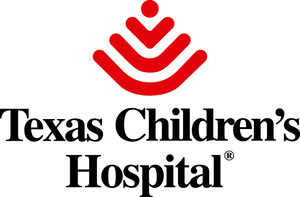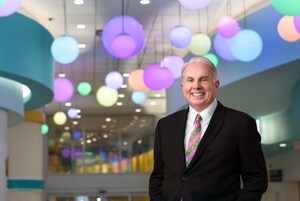Anti-rejection drug reduces seizures in patients with genetic disorder, say doctors at Texas Children's Hospital, Baylor College of Medicine and Cincinnati Children's Hospital
"Bench-to-bedside" breakthrough is collaboration between hospital's Jan and Dan Duncan Neurological Research Institute, Blue Bird Circle Clinic for Pediatric Neurology and Cincinnati Children's Hospital Medical Center
Video discussing the drug trial here: https://waystogive.texaschildrens.org/page.aspx?pid=1937
HOUSTON, July 16, 2013 /PRNewswire-USNewswire/ -- Everolimus, a drug used to treat cancers and prevent rejection of transplanted organs, reduced the occurrence of seizures in patients with a genetic disorder called tuberous sclerosis complex in a small prospective study conducted by experts at Texas Children's Hospital, Baylor College of Medicine and Cincinnati Children's Hospital Medical Center and reported online in the journal Annals of Neurology (http://onlinelibrary.wiley.com/doi/10.1002/ana.23960/abstract).
To view the multimedia assets associated with this release, please click http://www.prnewswire.com/news-releases/anti-rejection-drug-reduces-seizures-in-patients-with-genetic-disorder-say-doctors-at-texas-childrens-hospital-baylor-college-of-medicine-and-cincinnati-childrens-hospital-215740651.html
Tuberous sclerosis complex results from faulty signaling in a key molecular pathway, causing abnormal cell growth that affects the skin, brain, lungs and heart, said Dr. Angus Wilfong, director of the comprehensive epilepsy program at Texas Children's Hospital and associate professor of pediatrics and neurology at Baylor College of Medicine. The seizures suffered by patients with the disorder occur because of the abnormal growths in the brain, said Wilfong, an author of the report.
Everolimus suppresses the activity of the mTOR pathway, which is overactive in this disorder, said Wilfong.
"Everolimus treatment reduced seizure frequency and duration in the majority of tuberous sclerosis complex epilepsy patients whose seizures previously did not respond to treatment," said Dr. Darcy Krueger, a pediatric neurologist at Cincinnati Children's and lead author of the study. "This improvement in seizure control was associated with a better quality of life, and side effects were limited. Work is already underway to confirm these results in a follow-up, phase III clinical study."
"This has been positively life-changing for the patients involved and is nothing short of transformative in the treatment of epilepsy associated with cellular growth disorders, such as TSC (tuberous sclerosis complex)," said Wilfong.
Twenty patients with the disorder and difficult-to-treat epilepsy received the drug for a 12-week trial and their symptoms monitored. Seizures were reduced on average (median) by 73 percent in 17 of the 20 patients. Patients and their parents also reported reduced frequency and duration of the seizures. In fact, seizure frequency was reduced by 50 percent in 12 of the 20 patients. There were adverse events, but only one was considered severe.
"As the leading genetic cause of epilepsy, our hope is that treatment options will be available to allow individuals with tuberous sclerosis complex to live a quality life, and this study has opened a new door," said Kari Luther Rosbeck, president and chief executive officer of the Tuberous Sclerosis Alliance.
It is estimated that TSC is diagnosed in one in 6,000 live births and affects more than 1 million individuals worldwide. For 9-year-old clinical trial participant Aiden Maxwell from Pearland, Texas, the results are transformational. Aiden, who suffers from TSC, had as many as three uncontrolled epileptic seizures a day, disrupting his brain development and hampering his ability to learn. As a result of administering everolimus, Aiden is now completely seizure-free, giving him a chance to attend regular classes at school and lead an independent life, Wilfong said.
Wilfong said that the drug may have broader implications for the more than one million people in the United States who suffer with intractable epilepsy not responsive to seizure-suppressing medications.
"For the first time, we are administering a drug that restructures the brain and the way it sends and receives the signals that are causing seizures," said Wilfong. "This is a disease-modifying therapy, not just a seizure-control therapy. Until now, drugs have mainly been used to control seizures, but did not address the underlying cause of the seizures."
Supporting this new approach, Wilfong said, is a true "bench to bedside" collaboration with Dr. John Swann, Ph.D., professor of pediatrics – neurology and neuroscience at Baylor, and co-director of the Jan and Dan Duncan Neurological Research Institute at Texas Children's Hospital (NRI), one of the world's first basic research institutes dedicated to childhood neurological disease. Swann is also scientific director of the Gordon and Mary Cain Pediatric Neurology Research Foundation Laboratories.
Focused on understanding and curing the causes of childhood epileptic seizures, Swann and his research team were able to characterize the pathway abnormality and, through the study of animal models with that brain condition, identify ways to suppress the pathway signaling with drug therapies. Initially the NRI research team saw promising results in animal models using the cancer drug, rapamycin. The rapamycin research helped drive the clinical trial with everolimus, a drug with similar properties and fewer side effects.
"One of the really wonderful things about working at Texas Children's Hospital and here in the Blue Bird Clinic for Pediatric Neurology is our partnership with the NRI," said Wilfong. "I can take clinical problems that I'm faced with every day in treating children with epilepsy and talk to Dr. Swann and his colleagues in the NRI. We collaborate on strategies to understand these diseases and the translational research at the NRI is invaluable in determining if a treatment will be effective and safe before bringing it to the clinical side."
Swann, who is professor of pediatrics and neuroscience at Baylor College of Medicine, explains that the ongoing dialog and information sharing from the clinic to the lab and from the lab to the clinic is invaluable in advancing research. "Ours is a unique relationship in the field of pediatric neuroscience and it creates a dynamic that doesn't exist in many places," said Swann. "It allows us to study neurological diseases collaboratively between lab and clinic and move intervention therapies forward faster."
Texas Children's experts are pursuing another clinical trial to determine if everolimus can reduce seizures in children with Sturge-Weber syndrome, a rare congenital neurological and skin disorder. The Phase II trial will soon be enrolling patients.
Wilfong concludes, "If we can prove the effectiveness of this drug in other types of epilepsy-causing syndromes such as Sturge-Weber, we believe it can have almost limitless possibilities in many types of epilepsy that are affected by the mTOR pathway. For the first time, we may have a true anti-epileptic drug that can change the natural history of devastating diseases associated with seizures and epilepsy by reshaping the human brain."
This study was led by Dr. Krueger at Cincinnati Children's Hospital in conjunction with Texas Children's Hospital. Others who took part in this work include Katherine Holland-Bouley, MD, PhD, Anne E. Anderson, MD, Karen Agricola, CFNP, Cindy Tudor, CPNP, Maxwell Mays, BS, Christina M. Lopez, BS, Mi-Ok Kim, PhD and David Neal Franz, MD.
Funding for this study came from the Clack Foundation and Novartis Pharmaceuticals, which makes everolimus.
About Texas Children's Hospital
Texas Children's Hospital, a not-for-profit organization, is committed to creating a community of healthy children through excellence in patient care, education and research. Consistently ranked among the top children's hospitals in the nation, Texas Children's has recognized Centers of Excellence in multiple pediatric subspecialties including the Cancer and Heart Centers, and operates the largest primary pediatric care network in the country. Texas Children's has completed a $1.5 billion expansion, which includes the Jan and Dan Duncan Neurological Research Institute; Texas Children's Pavilion for Women, a comprehensive obstetrics/gynecology facility focusing on high-risk births; and Texas Children's Hospital West Campus, a community hospital in suburban West Houston. For more information on Texas Children's, go to www.texaschildrens.org. Get the latest news from Texas Children's by visiting the online newsroom and on Twitter at twitter.com/texaschildrens.
Contacts:
Christy Brunton
Texas Children's Hospital
O: 281-684- 3184
C: 832- 824 -2645
[email protected]
SOURCE Texas Children's Hospital
WANT YOUR COMPANY'S NEWS FEATURED ON PRNEWSWIRE.COM?
Newsrooms &
Influencers
Digital Media
Outlets
Journalists
Opted In






Share this article